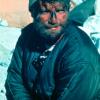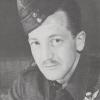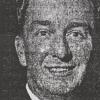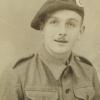Dick Hargreaves joined the Territorial Army in May 1939 as a Fusilier in the 12th Battalion Royal Fusiliers, whilst working as a receptionist at the Berkeley Hotel, London, having served 20 months in the kitchens and six months as a waiter.
He was promoted to Intelligence Sergeant as he could speak passable French and German.
Dick was detailed to look after a regular German officer (in his uniform), who was attached to the battalion, at the fortnight summer camp in the New Forest in August 1939, as he was virtually the only German speaker. The battalion was very poorly equipped with weapons and hardly trained at all. On leaving the battalion, the German officer requested maps as his wife was joining him for a holiday in Cornwall. Dick asked the Commanding Officer (CO), who readily agreed, and the German left the battalion (some 4 weeks before war was declared against Germany) with a full set of Army maps for Southern England! His report on the unit to his headquarters would have been very interesting!
The battalion was embodied on 1 September 1939 but was only destined to become a reinforcement battalion and never went into action. In December 1939, Dick was commissioned with the Royal Fusiliers, without having to attend an OCTU, and was posted back to the 12th Battalion at the special request of the CO.
He successfully attended many courses including the Small Arms School at Hythe, the six week Signal course at Catterick, the 47th Division Battle School and a Company Commander’s course.
In January 1942, he was appointed as one of the original instructors at the GHQ Battle School at Barnard Castle, under Lt Col Lionel Wigram.
He volunteered for The Parachute Regiment and qualified as a military parachutist on course 17, which ran at RAF Ringway in July 1942, and initially served as Adjutant, and Captain, under Lieutenant Colonel J A Dene in the 4th Parachute Battalion at Bulford.
The 4th Bn went overseas by ship to North Africa in May 1943, landing at Oran, for acclimatisation and heavy training, with the greatly experienced members of the 1st Parachute Brigade.
In July 1943 the 2nd Independent Parachute Brigade was tasked with capturing Augusta, on the east coast of Sicily and south of Catania. In the event their operation was cancelled as 13 Corps was able to secure the objective unaided. Several aircraft had already taken off and had to be recalled. It was a great disappointment to the 4th Bn who had the lead role.
As Adjutant, Dick was responsible for setting up the ‘rest zone’ before emplaning. He used German PoWs to make latrines for all ranks – they dug excellent slit trenches for all the other ranks but dug a huge pit for the officers, each side being nine foot long, so there was no hope at all of striding it! The officers had to use toggle ropes attached to palm trees to lower themselves into a reasonably safe position! The Germans laughed hugely at their distress!
On 9 September 1943, the 2nd Independent Parachute Brigade landed by Royal Navy cruisers and minelayers in Taranto Harbour, having passed the Italian Navy sailing south to surrender in Malta. German resistance in Taranto was minimal and the town was soon cleared. However the 4th Battalion, on 15 September, was tasked with attacking German positions (their 1st Parachute Division, which fought so well in North Africa) on high ground overlooking an important bridge at Laterza, some 20 miles north of Taranto.
Dick, by now Officer Commanding B Company, was tasked with leading this force, consisting of his company and ancillary troops including engineers – totalling just over 100 men. He sent his senior subaltern out the previous night to recce the exact German positions. However, the subaltern got lost the next night while leading the force and Dick had to redirect everyone, so that the attack took place at 3 am and not at midnight as planned.
The approach march over 3 miles, with 100 men, was very difficult indeed. The route crossed vineyeards and melon fields to avoid farm tracks and farm houses, which were regularly visited by the Germans, as well as having loud barking guard dogs. The attack went in at 03.30 hrs against heavy machine gun fire, mortars, fixed lines of trip wires, and ended with a spirited bayonet charge. Around 32 Germans were killed and many of their wounded were taken back in armoured carriers. 4th Bn losses were two killed and nine wounded, all of whom managed to return, some on farm gates used as makeshift stretchers. The force withdrew, on orders from the battalion, at 04.45 hrs under long range mortar fire and heavy machine gun fire. Dick was awarded an immediate Military Cross, on his return to the safety of Allied lines.
The brigadier and his staff were watching, by binoculars, from a hill some distance away from the bridge and, at first light, saw people coming down the hill from Laterza. Assuming it was a counter attack, he ordered the divisional artillery to prepare to fire, but in fact, it was only the entire village coming down to the river for their morning ablutions!
Three days later the CO, Lt Col Tony Dene, was anxious to keep tabs on the German parachutists and, against local advice from Dick and others, drove up the road past B Coy’s outlying positions to observe them. He was captured by the Germans and held as a prisoner for the remainder of the war.
The 4th Bn was then taken over by Lt Colonel H B ‘Vic’ Coxen DSO MC, who was a very distinguished company commander from the 1st Parachute Battalion under Lt Colonel Alastair Pearson DSO MC in North Africa. The 4th Bn was delighted to have such an officer, who went on to command the battalion through Italy, south of France and Greece with great skill and care.
The unit, which operated as part of the 2nd Independent Parachute Brigade, fought in the Sangro River and patrolled constantly from Casoli into the Majella mountain range, fighting German units in outlying villages. One of the local problems at Casoli was accepting interviewing and interrogating Allied prisoners who had escaped from Italian prisoner of war camps and walked back south through the mountains - nearly all in ragged civilian clothes with a variety of accents – Polish, South African etc. It was well known that the Germans were using this method of getting ‘spies’ through Allied lines.
The 2nd Independent Parachute Brigade established a reputation for aggressive patrolling and information gathering and as a result was placed at various times under the command General Freyberg’s New Zealand Division, the Canadians and an Indian Division. It fought at Orsogna with the Canadians, thereby gaining a battle honour for The Parachute Regiment.
While under command of the Indian Division, the battalion’s men, who were frightened of the ‘kukris’ and not knowing their passwords, became concerned about returning through Gurkha lines after a patrol!
In April 1944 the brigade moved across to the west coast of Italy and were stationed in Cassino for three weeks. The 4th Bn was chosen to be in the town and the railway station. The local countryside had been bombed by the Americans, making it impossible for tanks to use it and had to use the old railway line, which of course was a fixed line for German fire. Tanks brought up ammo and hot food to the railway station and took the badly wounded back, with stretcher cases strapped on the outside of the tank – very unpleasant for them.
The 4th Bn inherited watering arrangements from the outgoing unit. It could get water from the River Rapide between 1am and 2 am, which ran through the town, without German fire. Similarly, the Germans collected their water between 2am and 3am on the understanding that the British would not fire. Dick never found out which unit had organised this procedure many weeks previously.
In May 1944, the 4th Bn went to Salerno to rest and recuperate for a month, after having been on the go continuously since September 1943. In July it drove up to Rome to practice the airborne assault for the south of France.
The battalion flew from Rome on 15 August 1944 at 0100 hours and jumped on and around Le Muy near Draguignan in Provence at 0500 hours. There was a very heavy ground mist and most of the men in Dick’s stick thought they were jumping into the sea. The battalion’s CO and A Company were all dropped 20 miles adrift of the dropping zone, thereby taking a day to join the fighting around Le Muy.
Dick with B company was luckier and assembled at the battalion rendezvous by 06.20 hours, having collected two platoons. He set off at once to capture the high ground overlooking Le Muy and an entire road bridge which was B Company’s objective. At first light, in open order, they were mistaken for Germans by a group of American parachutists, comprising two officers and twenty two men, who surrendered without firing a shot! None of them had been in action before and were placed under Dick company as the reserve platoon.
Later that morning, B Coy’s own third platoon arrived and Dick sent the Americans off with his Sergeant – as they had also been dropped off target. The fighting there was not serious, although the 4th Bn had casualties from fighting and many more from the actual drop. According to Dick many of the German troops were resting from Russia and appeared not too anxious to fight hard.
The local resistance – the Maquis – spent the first week settling old scores with well-known collaborators, shaving women’s head etc. The battalion asked for guides and was provided with excellent young boys of 14 and 15. The 4th Bn was only in France for three weeks and returned to Italy by sea getting back by mid September 1944 and heard the Arnhem story over the radio day by day.
General Alexander, Commander in Chief, wanted to attack the Germans occupying the Greek Islands and so on 16 October 1944 the 4th Bn jumped at Megara between the Corinth canal and Athens in daylight.
With no time for formal planning to choose a drop zone (DZ), Lt Col Coxen had to select where to jump from the door of his Dakota. The combination of a 35-40 mph wind and huge boulders under the olive trees on the DZ caused many casualties including the mortar officer and several men were killed by being dragged.
The 4th Bn ‘borrowed’ trucks and vans and Dick acquired the use of three fishing caiques to get B Company across a large stretch of water, without any of its own transport, into Athens. The Germans had left the day before mostly by rail as road bridges going north had been damaged by the guerrilla forces. There were huge celebrations by the Athenians.
After two days it was decided to form 'Pompforce' consisting of B and C Companies of 4 Parachute Battalion, two squadrons of the Special Boat Service, raised and commanded by Lt Col the Earl Jellicoe, a few engineers and medics. Pompforce was commanded by the promoted George Jellicoe as a full Colonel, with Lt Col Vic Coxen as second in command. Its role was to harass and kill as many of the retiring Germans as possible. The force travelled by jeeps through the mountain villages to the west of the only railway line, frequently attacking the trains carrying Germans but avoiding the flat wagons at the rear which had tanks and heavy machine guns on them. No prisoners were taken as the force had no spare transport or food. The local male guerrillas were EAM/ELAS communists who did not join in this fighting.
Dick recalled: 'All the mountain villages we went through had been burnt and pillaged. We tried to get carts or mules off them to get ourselves, mortars and mortar bombs from the mountain roads to the railway line, but we could get nothing. But they were happy for their wives and elder children to carry the mortar bombs for us in payment of gold sovereigns – all day trips many times!'
The Germans made a stand at Kozani occupying the high hill on the outskirts, with a considerable force and a night attack was ordered. ‘C’ company was chosen, and promised 600 guerrillas as guides and fighters. Not a single one appeared, leaving C Company heavily outnumbered by the Germans. Major Jamie Gourlay MC was Officer Commanding and the men managed to capture the hill, inflicting heavy casualties but were forced to withdraw because of a very strong counter attack. Getting the wounded men off the steep rocky hill in the dark was very difficult and some casualties were left behind because of a shortage of stretchers.
Captain Rupert Teade, second in command of ‘C’ Company, was shot in the throat and a stretcher case. He was the battalion heavyweight boxing champion, 6ft 2in and nearly 16 stone. He slipped off the stretcher several times and eventually died later that morning.
'On day break, Major Gourlay sent a strong party up the hill, only to find that all our troops left there, mostly dead, had been totally stripped of their uniforms. The EAM/ELAS had taken them to use in Athens some four weeks later to deceive us, as we later found. out. Major Gourlay earned a well deserved bar to his MC. We went on with our derailing technique until arriving at Florina on the Greek Northern border. There Pompforce had orders from Cairo to halt there, hand over to the Russians coming in from the East and return to Athens.'
The rest of 4th Parachute Battalion and the 2nd Independent Parachute Brigade had gone up to Salonika but they were also ordered back to Athens. In late December and until mid January 1945, 2nd Independent Parachute Brigade was heavily and successfully involved in fighting the EAM/ELAS who were trying to capture Athens for the communists. Had the communists in Greece been successful the 'Iron Curtain' could potentially have included Greece and provided Russia with a Mediterranean Naval base.
'I left the 4th Parachute Battalion in Athens in mid December 1944 to start on the Haifa Staff College in Jan 1945. Lord Jellicoe was also a student and we became firm friends. At the end of that course I was posted as Brigade Major, 10th Infantry Brigade, 4th British Division which was in Greece. It suited me well, as I knew the country and had many good Athenian friends. 10 Brigade was in Athens and later in Kavalla in Macedonia. Our role, principally, was rounding up bad men and keeping an eye open on the Turkish/Greek border for any Russian intrusion.'
Dick was demobilised in July 1946, aged 26, having got married to a WRNS officer in 1945 whilst on leave in the UK. They had been engaged since 1943.
'Post war I had a successful career in various businesses. I worked for Gallaher, tobacco manufacturer, becoming a main board director for twelve years. Then I worked for the Savoy Hotel Group (I had been a pre-war trainee with them) for eighteen years mostly as a main board director. I was their director responsible for overseeing the building, equipping and staffing of the new Berkeley Hotel. At the same time I was a non executive Director of Reids Hotel in Madeira and also chairman of the Lygon Arms Hotel in Broadway in the Cotswolds.
Later I became chairman of JA Devenish, West Country brewers, who ran two breweries and several hundred pubs in Dorset and Cornwall. I was with them for ten years. I was a City of Westminster Councillor for four years and was Deputy Lord Mayor in 1977, the 25th Anniversary year – very busy.
In 1978 I was Master of the Tobacco Livery Company in the City of London. From 1958 to 1970 I was on the Special Constabulary, starting as a Constable and finishing as a Chief Inspector on the Surrey force.
After retiring we lived in Lymington where I had a cruising yacht, as well as racing ‘x’ boats. Lymington became overcrowded with new houses and a second marina, so we moved house to Abbotsbury in Dorset for 6 years and then to Littlebredy in Dorset for 14 years and finally to our present house in 1992, twenty years ago.
When in Dorset I was a founder member of Joseph Weld Hospice, responsible for raising £3.5 million and for the design and building of the hospice. The Prince of Wales became our Patron and I was chairman of the hospice for 12 years.
My wife died in 2000. We have four children, seven grandchildren and two great grandchildren.
I was made a Chevalier of the Legion d’Honneur in 2005, recognising my time as a Major in the South of France, landing in August 1944.'
Compiled by David and Carolyn Mallam
Read More




Latest Comments
There are currently no comments for this content.
Add Comment
In order to add comments you must be registered with ParaData.
If you are currently a ParaData member please login.
If you are not currently a ParaData member but wish to get involved please register.